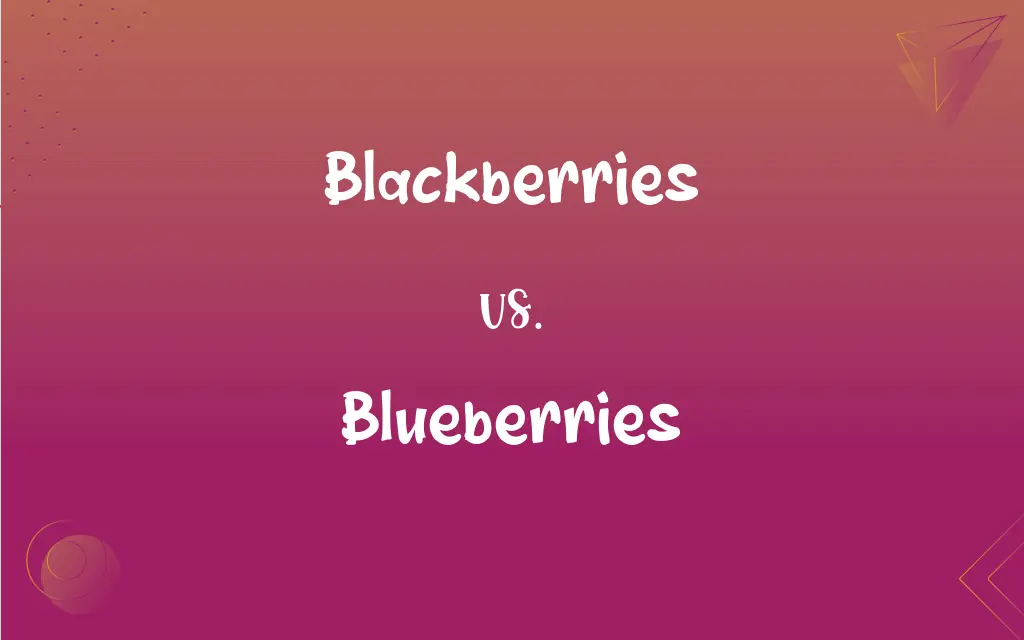Blackberries vs. Blueberries: What's the Difference?
Edited by Aimie Carlson || By Janet White || Published on January 26, 2024
Blackberries are larger, dark purple-black fruits with a tart, sweet flavor and multiple tiny seeds, while blueberries are small, round, blue-purple berries with a sweet, mildly tangy taste

Key Differences
Blackberries are larger, aggregate fruits composed of multiple small drupelets, each containing a seed, giving them a textured feel. In contrast, blueberries are small, individual berries with a smooth, round shape and contain tiny, soft seeds that are barely noticeable.
The flavor of blackberries is a mix of tart and sweet, often more intense, and varies depending on ripeness. Blueberries offer a consistently sweet, mildly tangy flavor, with less variation in taste between individual berries.
In terms of color, blackberries have a deep purple-black appearance when ripe. Blueberries are known for their distinctive blue to purple color, with a natural bloom that gives them a slightly matte finish.
The nutritional profile of blackberries includes high fiber, vitamins C and K, and antioxidants. Blueberries are also rich in nutrients, particularly known for their high antioxidant levels, specifically anthocyanins, contributing to their health benefits.
Cultivation-wise, blackberries grow on brambles and are more commonly found in wild or cultivated in gardens. Blueberries are cultivated on bushes, both in wild 'lowbush' varieties and cultivated 'highbush' varieties, suited for commercial farming.
ADVERTISEMENT
Comparison Chart
Size and Structure
Larger, aggregate of drupelets
Smaller, individual berries
Taste
Tart-sweet, varies with ripeness
Consistently sweet, mildly tangy
Color
Deep purple-black
Blue to purple with a natural bloom
Nutritional Value
High in fiber, vitamins C and K
Rich in antioxidants, particularly anthocyanins
Cultivation
Grown on brambles, in the wild or gardens
Cultivated on bushes, in wild and commercial varieties
ADVERTISEMENT
Blackberries and Blueberries Definitions
Blackberries
A dark purple-black fruit with a mix of tart and sweet flavors.
She added fresh blackberries to her morning yogurt for extra flavor.
Blueberries
Small, round berries with a sweet, mildly tangy taste.
He sprinkled blueberries on his cereal every morning.
Blackberries
Fruits commonly found in the wild or cultivated in gardens.
They went blackberry picking in the nearby woods.
Blueberries
Rich in antioxidants, particularly anthocyanins, contributing to health benefits.
She made a smoothie with blueberries for a healthy antioxidant boost.
Blackberries
Nutritious berries high in fiber and vitamins.
Eating blackberries is a delicious way to boost your vitamin intake.
Blueberries
Cultivated on bushes, including wild and commercial varieties.
Their farm specialized in cultivating highbush blueberries.
Blackberries
Aggregate fruits composed of small drupelets, each containing a seed.
Blackberries' unique structure makes them perfect for fruit salads.
Blueberries
Known for their distinctive blue to purple color and smooth texture.
The blueberries added a pop of color to the fruit platter.
Blackberries
Berries known for their deep purple-black color and textured feel.
The blackberries were ripe and ready to be harvested.
Blueberries
Berries with tiny, soft seeds that are barely noticeable.
The soft seeds in blueberries make them easy to eat and enjoy.
Blackberries
Any of various shrubs of the genus Rubus in the rose family, having usually prickly stems, compound leaves, and an aggregate fruit of small drupelets.
Blueberries
Any of various plants of the genus Vaccinium, having white to reddish, urn-shaped or tubular flowers and edible blue to blue-black berries, especially the highbush blueberry and the lowbush blueberry.
Blackberries
The fruit of these plants, usually black, purple, or deep red.
Blueberries
The fruit of any of these plants.
Blackberries
Plural of blackberry
Blueberries
A usually blue-gray spherule that is found in soil and sedimentary rock and is rich in hematite, produced by the weathering of rock or by precipitation from rock by moving groundwater.
Blackberries
Infl of blackberry
Blueberries
Plural of blueberry
Blueberries
Infl of blueberry
FAQs
Are blackberries and blueberries the same?
No, they are different in taste, structure, and nutritional content.
Can you eat the seeds in blackberries?
Yes, the seeds are edible and part of the fruit's texture.
Do blackberries grow on bushes like blueberries?
They grow on brambles, which are different from blueberry bushes.
Do blueberries change color when ripe?
They turn from green to blue-purple as they ripen.
What's the best way to store blackberries?
In the refrigerator, in a breathable container.
How do you know when blueberries are ripe?
They are fully blue and slightly soft to the touch.
Are blueberries good for health?
Yes, they are high in antioxidants and nutrients.
What dishes are blackberries commonly used in?
Jams, desserts, salads, and as fresh snacks.
Is the skin of blueberries edible?
Yes, the entire berry, including the skin, is edible.
Are blackberries more tart than blueberries?
Generally, yes, especially if not fully ripe.
Can blackberries be eaten raw?
Yes, they are commonly eaten raw and fresh.
Do blackberries have more seeds than blueberries?
Yes, they have multiple seeds in each drupelet.
How long do blackberries last after picking?
A few days to a week when refrigerated properly.
Can blueberries be frozen for later use?
Yes, they freeze well and retain their flavor.
Can blueberries help with digestion?
Yes, due to their fiber content.
Are blueberries acidic or alkaline?
They are slightly acidic.
Are blackberries used in traditional medicine?
Yes, in some cultures, for their nutritional and medicinal properties.
Are blueberries high in sugar?
They have natural sugars but are relatively low in calories.
What is the nutritional difference between blackberries and blueberries?
Both are nutritious, but they vary in vitamin and antioxidant content.
Can you grow blueberries at home?
Yes, with the right soil and climate conditions.
About Author
Written by
Janet WhiteJanet White has been an esteemed writer and blogger for Difference Wiki. Holding a Master's degree in Science and Medical Journalism from the prestigious Boston University, she has consistently demonstrated her expertise and passion for her field. When she's not immersed in her work, Janet relishes her time exercising, delving into a good book, and cherishing moments with friends and family.
Edited by
Aimie CarlsonAimie Carlson, holding a master's degree in English literature, is a fervent English language enthusiast. She lends her writing talents to Difference Wiki, a prominent website that specializes in comparisons, offering readers insightful analyses that both captivate and inform.







































































